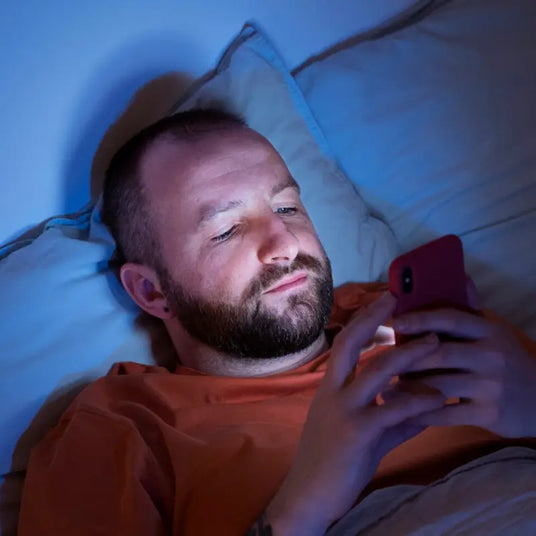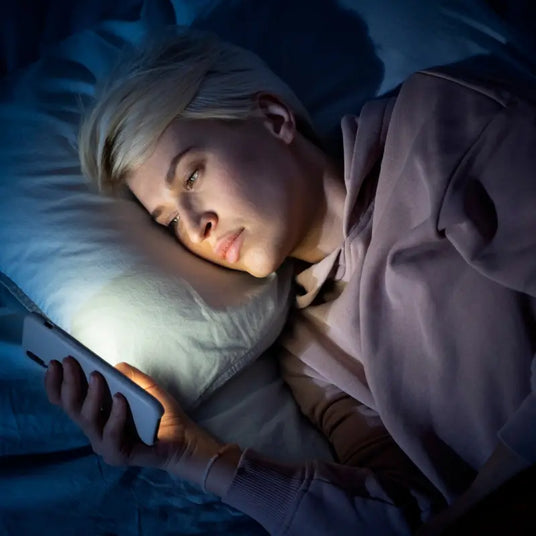
Free Buteyko Audio for Insomnia
Improve your sleep with our free Buteyko audio guide for insomnia with Buteyko Breathing expert, Patrick McKeown. Learn techniques to activate your body's relaxation mode for deeper, better-quality sleep.
Buteyko Breathing Techniques for Insomnia:
Natural Help for Better Sleep
Insomnia is a common sleep issue, often linked to hyperarousal or disrupted breathing patterns during sleep. Causes of insomnia can include heavy snoring, upper airway resistance, or sleep apnea—conditions that repeatedly wake the sleeper. Even breathing that is too fast or hard during sleep can lead to wakefulness. While there are many factors contributing to insomnia, applying Buteyko Breathing techniques alongside good sleep hygiene can greatly improve your sleep quality. Insomnia often shows up in two main ways: difficulty falling asleepandwaking in the middle of the night.

Difficulty Falling Asleep
Finding it hard to fall asleep can often result from an overstimulated mind. This overstimulation may stem from stress, information overload, or even scrolling through social media before bed.
Additionally, breathing patterns that are too fast or too hard can signal to the brain that the body is under threat. As a result, the brain may resist sleep, perceiving it as a vulnerable state. Calming and slowing your breathing can help tell the brain it’s safe to relax and drift into sleep.
Tips for Falling Asleep More Easily
-
![Commit to Nasal Breathing]()
Commit to Nasal Breathing
Practice nasal breathing throughout the day, during rest, exercise, and sleep. Nasal breathing promotes a calm, steady breath that carries over into the night.
-
![Work Toward a CP Score of 20 Seconds]()
Work Toward a CP Score of 20+ Seconds
A Control Pause (CP) score over 20 seconds is an indicator of breathing stability, which is important for restful sleep.
-
![Breathe Light]()
Practice “Breathe Light” for 20 Minutes Before Bed
This exercise helps to slow your breathing rate, preparing your body for sleep. Try listening to our 20-minute guided audio for insomnia on Spotify, which includes the Breathe Light exercise to help you unwind. Access the recording below to start listening.

Waking in the Middle of the Night
Waking up after just a few hours of sleep can be frustrating, especially if you know you need the energy and focus for the next day. This pressure to fall back asleep quickly can create tension, making it even harder to relax.
An effective way to relax is by softening and slowing your breathing, which calms the mind and activates the body’s relaxation response. However, for many people, listening to a guided audio for insomnia provides even more relief.
When you wake up and listen to a guided audio, you release the pressure of “trying” to fall asleep. Trying implies effort, whereas simply listening allows you to ease back into rest. The audio guides you into sleep naturally, so you’ll find yourself growing sleepier until you gently nod off.
Free Buteyko Audio
Listen to the 20-Minute Guided Audio
This audio guides you through the Breathe Light exercise, activating the body’s natural relaxation response and reducing pressure to fall asleep.
Before bed, switch your phone to flight mode to minimize disruptions from EMFs or notifications. If you wake during the night, simply plug in headphones, play the audio, and relax. Let the audio do the work.
Additional Tips for Restful Sleep
-
Breathe Only Through the Nose at Night
Nasal breathing at night supports a lighter, slower breath driven by the diaphragm. If you often wake up with a dry mouth, consider using MyoTape or a similar nasal support to promote nasal breathing during sleep.
-
Improve Your Everyday Breathing
As your CP score gradually improves, so does your breathing stability. Each 5-second increase in CP score is a step forward, and a CP of 20 seconds or more can reduce turbulence in the nasal passages and throat, supporting deeper, more restful sleep with fewer awakenings.
-
By incorporating these Buteyko Breathing practices into your routine, you’re building a foundation for deep, restorative sleep. With stabilized breathing and an improved CP score, you’ll experience fewer disruptions, better sleep quality, and more energy each morning.




